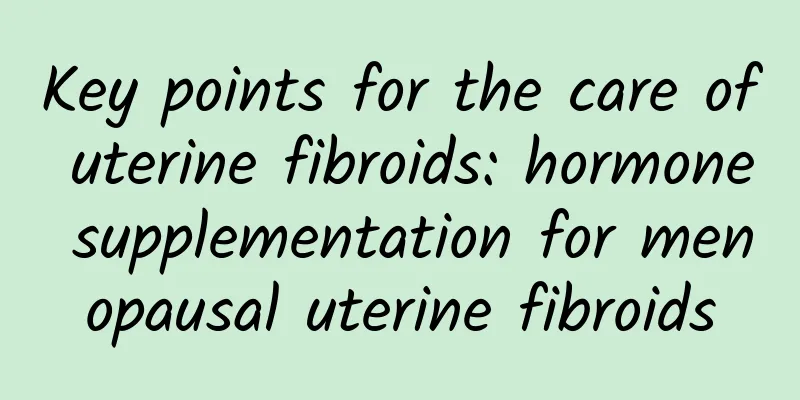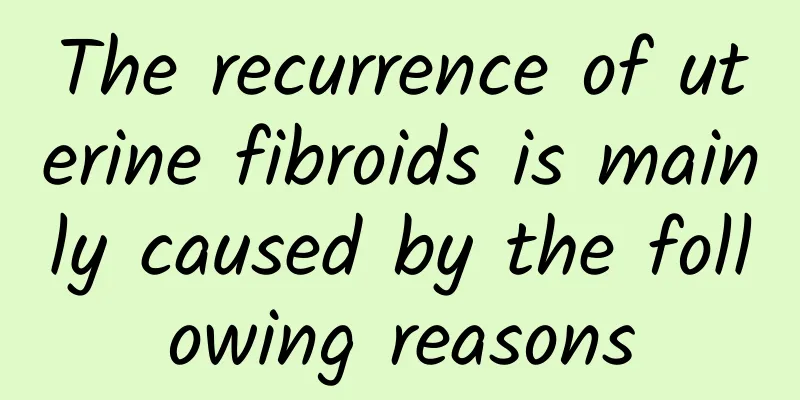Key points for the care of uterine fibroids: hormone supplementation for menopausal uterine fibroids

|
How should we take care of uterine fibroids in our daily life? How can we prevent uterine cancer in our daily life? Nursing tips for uterine fibroids: 1. Prevent excessive fatigue and pay special attention to rest during menstruation. 2 Eat more vegetables and fruits and less spicy food. 3. Keep the vulva clean and dry, and wear loose underwear. If there is too much vaginal discharge, wash the vulva at any time. 4. After being diagnosed with uterine fibroids, you should go to the hospital for regular check-ups. If the fibroids grow slowly or not at all, you can have a check-up every six months; if they grow significantly, you should consider surgical treatment to avoid severe bleeding or compression of abdominal organs. 5. Avoid getting pregnant again. Patients with uterine fibroids have poor uterine recovery after artificial abortion, which often causes long-term bleeding or chronic genital inflammation. If you have heavy menstruation in June, eat more iron-rich foods to prevent iron deficiency anemia. 7 Do not take extra estrogen, especially after menopause, to prevent the growth of uterine fibroids. 8Myomectomy can be used to preserve fertility and surgical treatment is necessary. Hormone supplementation for menopausal uterine fibroids Uterine fibroids and breast fibroids are relative contraindications to estrogen supplementation because they both rely on estrogen for growth. Whether these patients can supplement estrogen depends on the severity of menopausal symptoms. For patients with obvious menopausal symptoms, severe depression, anxiety, and even suicide, even if they have diseases such as uterine fibroids, estrogen should be supplemented first to correct menopausal symptoms. It is recommended not to rush to supplement estrogen or a small amount of phytoestrogens. Phytoestrogens mainly include isoflavones and lignans. The former are mainly found in beans, fruits and vegetables, and patients can drink soy milk and tofu in moderation; the latter are mainly found in grains, lentils, wheat, black rice, fennel and onions. |
<<: Is ovarian chocolate cyst a disease? What is the pathogenesis?
>>: What are the symptoms of ovarian cysts and how to diagnose them
Recommend
What are the specific reasons for early pregnancy miscarriage? There are 7 major reasons
Miscarriage during early pregnancy may be caused ...
Can I get pregnant with ovarian cysts? What should I pay attention to?
Can I get pregnant with an ovarian cyst? What sho...
How to care for female pelvic peritonitis
First, let's briefly introduce the basic know...
Female patients should pay more attention after abortion
Abortion is a very common thing in today's so...
Which hospital is best for treating moderate cervical erosion?
Cervical erosion is the most common gynecological...
Cervical precancer can shorten life expectancy by several years
How many years will cervical precancerous lesions...
How to prevent recurrence of vaginal candidiasis during pregnancy
Fungal infection is like a "gynecological co...
Eat to boost immunity, the rainbow diet is the most popular! Nutritionist Chen Yiwen: 7-color phytochemicals for antioxidant and immune-enhancing effects
The mask mandate has been lifted, but there are s...
How should women prevent cervical erosion? Women can do this to keep you away from cervical erosion
Cervical erosion is one of the common gynecologic...
What complications may occur due to irregular menstruation?
What complications will be caused by irregular me...
What are the main reasons for the recurrence of vaginitis?
What are the main reasons why vaginitis is prone ...
Is it good to drink soup after abortion? What to eat to nourish the body after abortion?
After an abortion, women's bodies are damaged...
Experts tell you the symptoms and characteristics of acute pelvic inflammatory disease
The incidence of acute pelvic inflammatory diseas...
What should you pay attention to after a miscarriage? Pay attention to these 8 points
According to relevant data, the number of abortio...
What causes menstrual irregularities? Bleeding after a few days of menstruation
Unclean menstruation is not an accidental disease...









